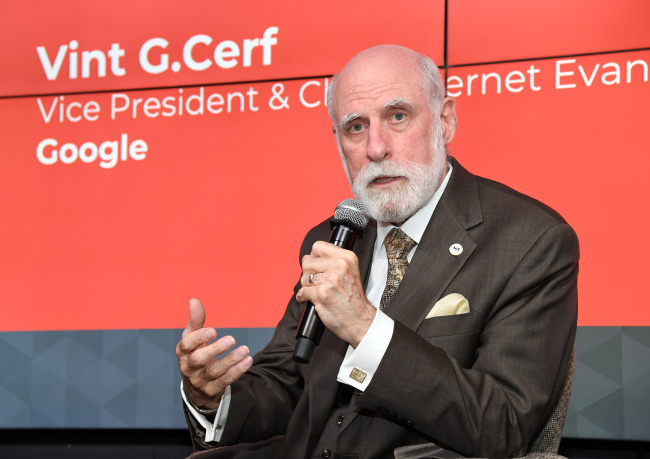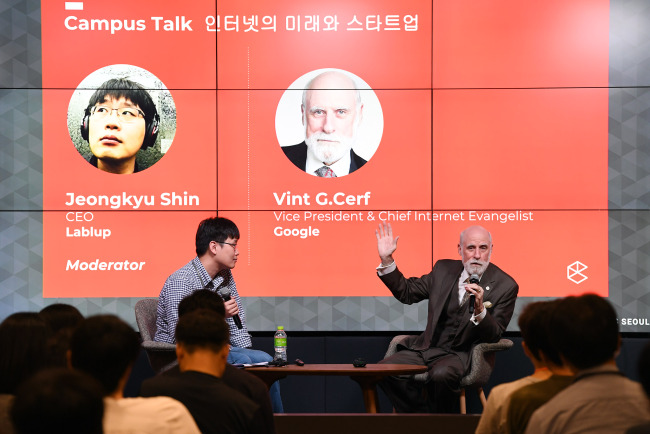The Internet of Things, abbreviated as IoT, is discussed today as a core technology concept expected to usher in a new era of digital connectivity around the world.
The IoT refers to billions of devices connected over the internet constantly collecting and sharing data, be it for an automobile or a household appliance. It’s a revolutionary concept in that objects can communicate with one another, rather than just with a human user, signaling a new level of digital intelligence.
While the IoT is an exciting concept with immense potential, it should be considered as not only a “big opportunity, but also a risk,” says Vint Cerf, chief internet evangelist at Google who is widely known as the “Father of the Internet.”
 |
Vint Cerf, chief internet evangelist at Google, delivers a speech at Google Campus Seoul in Samseong-dong, Gangnam District, Tuesday. (Google Korea) |
“There will be tens of billions of (IoT devices in the future) as we’ll be wearing them, placing them inside our homes, cars and more. That’s a whole new way of technology,” Cerf said during a special talk delivered Tuesday at Google Campus Seoul to mark the local startup hub’s third anniversary.
“It’s a big opportunity, but also a big risk,” Cerf said, stressing that the IoT is a complex concept and operating a successful IoT ecosystem takes more than an app, some internet connectivity and a device with software.
Scaling and interoperability are important challenges to keep in mind when developing IoT-based devices and solutions, explained Cerf, who co-designed the architecture of the internet and the TCP/IP protocols in the 1970s.
For instance, if you only have one device and one app, linking the two is easy. But what if you had 100 devices and 100 apps? Should a person have to flip through 100 apps to figure out how to get the door open?
If you were to use a voice command interface to control the lighting in your house, would you need to set a different name for each light?
“(I ask you these questions to) try to show you how complex the concept of IoT is, and how hard it will be to build a business,” Cerf said.
 |
Vint Cerf, chief internet evangelist at Google (right) speaks during an event in Google Campus Seoul in Samseong-dong, Gangnam District, Tuesday. (Google Korea) |
On top of these considerations, the Google-based internet expert also urged those pursuing a business in IoT to think of ways to provide long-term maintenance services as well as data security to customers who purchase their products.
Cerf also shared his position on a number of other contentious issues, including his disapproval of the US government’s pending decision to abolish net neutrality.
As for the problem of “fake news” on the web, he noted that it’s difficult for current computer software to discern whether it is a person or a bot endorsing a particular content on the web.
Given this, the Google executive urged users to exercise critical thinking, which he called the “most powerful filter for fake news” to discern what is accurate or dubious online content.
By Sohn Ji-young (
jys@heraldcorp.com)






![[Exclusive] Hyundai Mobis eyes closer ties with BYD](http://res.heraldm.com/phpwas/restmb_idxmake.php?idx=644&simg=/content/image/2024/11/25/20241125050044_0.jpg)
![[Herald Review] 'Gangnam B-Side' combines social realism with masterful suspense, performance](http://res.heraldm.com/phpwas/restmb_idxmake.php?idx=644&simg=/content/image/2024/11/25/20241125050072_0.jpg)

